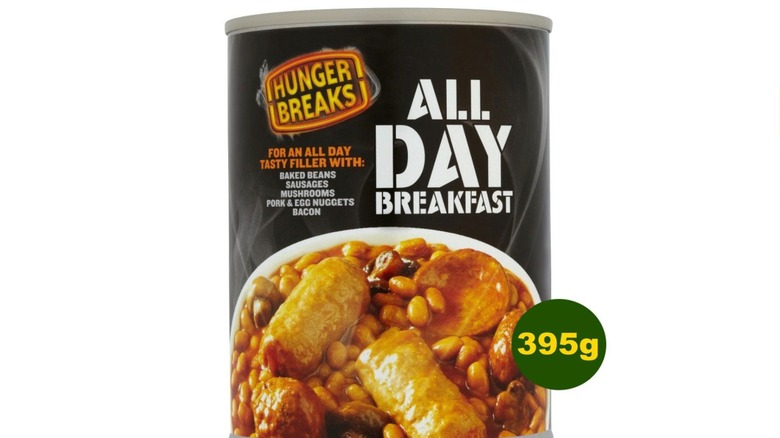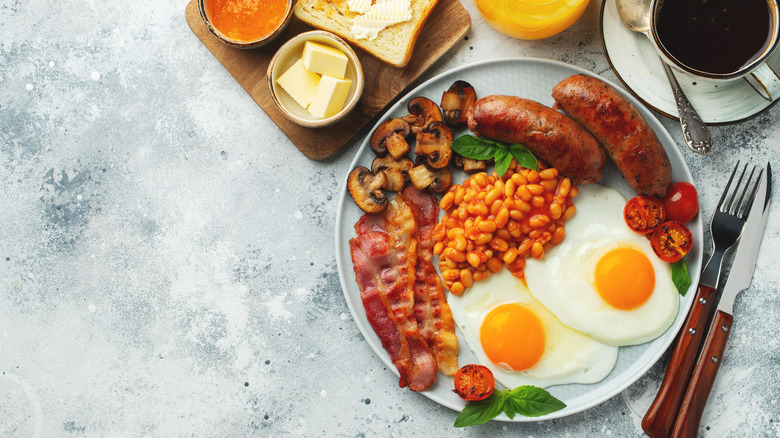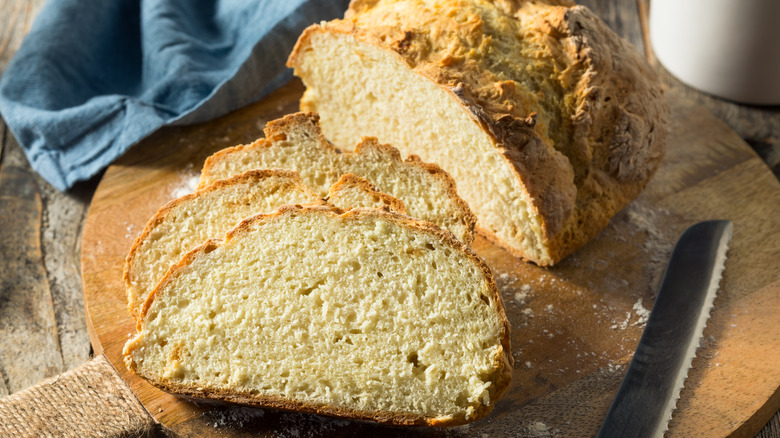Canned Full English Breakfast Is Actually A Thing
If there's one truism to modern culinary society, it's that if a food exists, someone somewhere will try to put it in a can. Canned whole chicken has long been a product available on store shelves, and canned bread is something of a regional dish in New England (hence its other name, New England brown bread). We've even seen an uptick in new frontiers of confused culinary cannery with the advent of canned sandwiches. There's no frontier of canning whose depths humanity will not attempt to plumb.
But if there's a food you would never expect to see in canned form, it would probably be something consisting of numerous components typically eaten separately, something with not just significant preparation time but ingredients with vastly different storage requirements. Something like, for example, a full English breakfast. Surely, no one would try to can that, would they? Oh, you sweet summer child.
The entire thing is a mishmash of (most of) the ingredients in a full English
A traditional full English breakfast includes tomatoes, mushrooms, baked beans, black pudding (also known as blood sausage), pork sausage, bacon, fried bread, and fried eggs. It can also include toast and hash browns and is one of England's signature dishes.
Apparently seeing a niche market opportunity, a company called Cross and Blackwell decided to create a canned English breakfast, which ... whoo boy. The beans are obviously fine — they're generally canned anyway. And while the tomatoes and mushrooms aren't going to be as good as fresh, those are products which are frequently canned regardless. Where it starts to run off the rails is when you consider that the product also advertises bacon, pork, and "egg nuggets."
It's not clear what "egg nuggets" actually are. But when you consider this entire hodgepodge is pre-mixed in the eldritch horror version of a KFC Famous Bowl, it can't possibly mean anything good.
The full English has a rich history — and plenty of regional variants
Though fish and chips is often considered the national dish of England, the full English breakfast is no less iconic — in part because the nature of everything being fried (the dish is also sometimes called a "fry-up" for this exact reason) understandably appeals to American culinary sensibilities.
The dish likely dates to the 13th century, though it only achieved widespread popularity during the 19th century and the Victorian era. Supposedly, Field Marshal Bernard Montgomery used to have a full English breakfast every day during the North African campaign in World War II (a possible reason the dish is sometimes referred to as the "Full Monty").
It's also not even the only type of "full" breakfast within its geographic region, as Ireland has its own version. A full Irish breakfast is similar to a full English — both include fried eggs, bacon, pork sausage, black pudding, tomatoes, and mushrooms — but with a few key differences. First, instead of fried bread, a full Irish typically comes with Irish soda bread. Second, there are no baked beans involved. But there is often also white pudding, which is essentially black pudding but without the blood.


